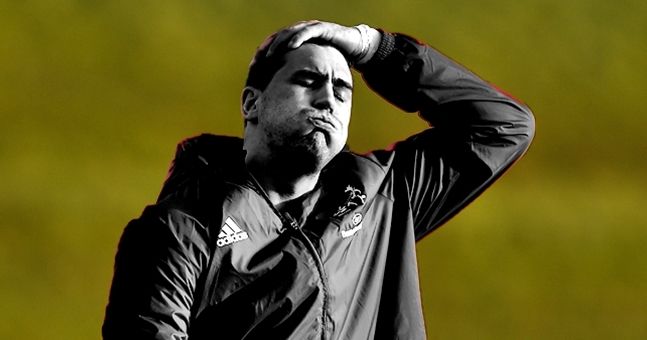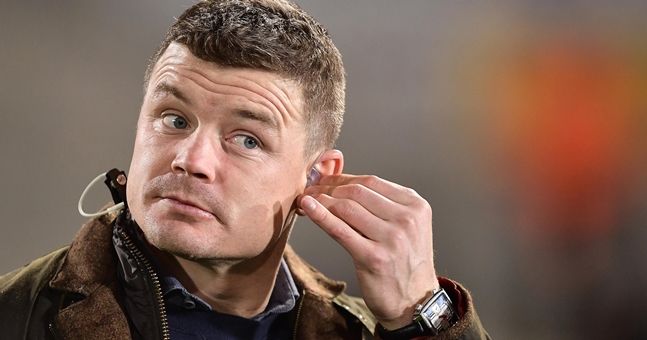

Share
9th February 2018
07:58pm GMT

 And this wasn't just Paul Kimmage and a couple of journalists on some doping crusade, no less than five internationals - Brian O'Driscoll, Shane Horgan, Gordon D'Arcy, Luke Fitzgerald and Donal Lenihan - condemned the move, while Ulster flanker Chris Henry said that most rugby players in Ireland would brand Grobler's signing as 'unacceptable', given that he was a player who took short cuts to the top.
When IRFU Chief Executive Philip Browne faced the media after Aviva extended their naming rights deal on Lansdowne Road, he said that the union approved Munster’s signing of Gerbrandt Grobler last summer in the full knowledge that the player had previously been banned for two years.
He added that the IRFU needed to review their policies when it came to signing players with a history of doping but never said that the union would not sign any players in the future with doping in their past.
The IRFU took their lumps and looked to have eventually moved on with the final rounds of the Champions Cup Pool stages and the start of the Six Nations, but with Grobler set to make his first PRO14 appearance for the province against Zebre on Saturday, Munster and the IRFU reopened the case by talking about how it was in the spirit of rugby to forgive a player who has made restitution.
Munster Rugby and the IRFU's Statement on Gerbrandt Grobler read:
And this wasn't just Paul Kimmage and a couple of journalists on some doping crusade, no less than five internationals - Brian O'Driscoll, Shane Horgan, Gordon D'Arcy, Luke Fitzgerald and Donal Lenihan - condemned the move, while Ulster flanker Chris Henry said that most rugby players in Ireland would brand Grobler's signing as 'unacceptable', given that he was a player who took short cuts to the top.
When IRFU Chief Executive Philip Browne faced the media after Aviva extended their naming rights deal on Lansdowne Road, he said that the union approved Munster’s signing of Gerbrandt Grobler last summer in the full knowledge that the player had previously been banned for two years.
He added that the IRFU needed to review their policies when it came to signing players with a history of doping but never said that the union would not sign any players in the future with doping in their past.
The IRFU took their lumps and looked to have eventually moved on with the final rounds of the Champions Cup Pool stages and the start of the Six Nations, but with Grobler set to make his first PRO14 appearance for the province against Zebre on Saturday, Munster and the IRFU reopened the case by talking about how it was in the spirit of rugby to forgive a player who has made restitution.
Munster Rugby and the IRFU's Statement on Gerbrandt Grobler read:
"In relation to Gerbrandt Grobler’s selection for the province, Munster Rugby and the IRFU wish to reiterate that Gerbrandt, as a member of the Munster squad and living by our values, will continue to be considered for selection during his time with the province, once deemed fit. "While some hold the view that rugby should provide no road-back for those that have taken a banned substance in the past, it would not be within the spirit and values of rugby to turn its back on every person that ever made a bad decision, having made restitution. "Irish Rugby is recognised as operating one of the most stringent testing environments of any rugby nation with a zero tolerance approach to doping in the sport. The province and Irish Rugby are fully supportive of all WADA and World Rugby anti-doping policies. "Gerbrandt Grobler served a two-year ban from rugby and returned to play for Racing 92 in November 2016 as per the process set out by World Rugby."There is almost a flaw in every paragraph. Does Grobler live by Munster's current values of a zero tolerance approach or when he signed were Munster happy to amend those values to fit a need?
 In relation to the second paragraph and the spirit of rugby, former Ireland captain Brian O'Driscoll called for a lifetime ban for dopers in rugby, a view shared by Luke Fitzgerald among others, do they not understand the spirit and values of rugby?
O'Driscoll, the second most capped player of all time no less.
As aforementioned, you can't have a zero tolerance policy towards doping then sign off on a known doper.
And lastly, a classic Irishism - 'Gerbrandt Grobler served a two-year ban from rugby and returned to play for Racing 92 in November 2016 as per the process set out by World Rugby' - sure he played for Racing, World Rugby are fine with it, it's grand.
It looks like the media storm, the constant coverage surrounding the Grobler signing was ultimately in vain. For those that like to look at journalism as fulfilling some sort of societal role, it seems that the incessant coverage only served as an ordeal that the IRFU and Munster had to weather, and not an instance that caused them to reflect.
If Munster buried Grobler in the Munster A's until his contract expired at the end of the season, it would have been an intended admission of wrongdoing, but instead, not only have they promoted Grobler to the first team, but they have had the audacity to say that anyone - including five internationals, three of which are Grand Slam winners, and a current player - who does not welcome him back into Irish Rugby does not understand the spirit and values of rugby.
Don't confuse Munster Rugby's values with rugby's values, the sport and the province clearly need to be distinguished with regards to this particular matter.
But once again, and unfortunately it's not the players that missed the point here, it's the powers that be.
A concerted decision to double down rather than back down.
In relation to the second paragraph and the spirit of rugby, former Ireland captain Brian O'Driscoll called for a lifetime ban for dopers in rugby, a view shared by Luke Fitzgerald among others, do they not understand the spirit and values of rugby?
O'Driscoll, the second most capped player of all time no less.
As aforementioned, you can't have a zero tolerance policy towards doping then sign off on a known doper.
And lastly, a classic Irishism - 'Gerbrandt Grobler served a two-year ban from rugby and returned to play for Racing 92 in November 2016 as per the process set out by World Rugby' - sure he played for Racing, World Rugby are fine with it, it's grand.
It looks like the media storm, the constant coverage surrounding the Grobler signing was ultimately in vain. For those that like to look at journalism as fulfilling some sort of societal role, it seems that the incessant coverage only served as an ordeal that the IRFU and Munster had to weather, and not an instance that caused them to reflect.
If Munster buried Grobler in the Munster A's until his contract expired at the end of the season, it would have been an intended admission of wrongdoing, but instead, not only have they promoted Grobler to the first team, but they have had the audacity to say that anyone - including five internationals, three of which are Grand Slam winners, and a current player - who does not welcome him back into Irish Rugby does not understand the spirit and values of rugby.
Don't confuse Munster Rugby's values with rugby's values, the sport and the province clearly need to be distinguished with regards to this particular matter.
But once again, and unfortunately it's not the players that missed the point here, it's the powers that be.
A concerted decision to double down rather than back down.Explore more on these topics: